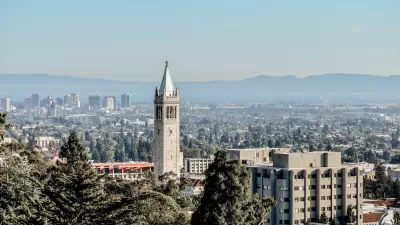Critics of a new provision calling “social noise” an environmental impact say the law can too easily be co-opted by anti-housing groups to block new development.

An opinion piece from early March by Jennifer Hernandez and Robert Apodaca in the Los Angeles Times outlines how community groups have used the California Environmental Quality Act (CEQA) to block new student housing at the University of California, Berkeley.
The authors argue that building more housing close to campus is in fact the more environmentally friendly option. “More students living near campus means less traffic.” But a recent court ruling halted plans for a new housing complex and forced the university to withhold admission from thousands of potential new students, citing the potential impacts of a higher population.
Now, a new court ruling deems noise from college parties an environmental impact, giving NIMBY groups another weapon in their fight against new university housing. The authors see this as a slippery slope to other restrictions. “The concept of ‘social noise’ is perfectly designed to block housing in existing neighborhoods. If this ruling stands, other demographic and individual behaviors could become adverse ‘environmental’ impacts under CEQA.” Meanwhile, the authors point out that students who experience housing insecurity are more likely to drop out, making affordable housing a crucial part of supporting student success.
More on the UC Berkeley story:
FULL STORY: Opinion: How California came to treat UC Berkeley students’ ‘noise’ as a dire environmental threat

Florida Considers Legalizing ADUs
Current state law allows — but doesn’t require — cities to permit accessory dwelling units in single-family residential neighborhoods.

Manufactured Crisis: Losing the Nation’s Largest Source of Unsubsidized Affordable Housing
Manufactured housing communities have long been an affordable housing option for millions of people living in the U.S., but that affordability is disappearing rapidly. How did we get here?

Americans May Be Stuck — But Why?
Americans are moving a lot less than they once did, and that is a problem. While Yoni Applebaum, in his highly-publicized article Stuck, gets the reasons badly wrong, it's still important to ask: why are we moving so much less than before?

EV Chargers Now Outnumber Gas Pumps by Nearly 50% in California
Fast chargers still lag behind amidst rapid growth.

Affordable Housing Renovations Halt Mid-Air Amidst DOGE Clawbacks
HUD may rescind over a billion dollars earmarked for green building upgrades.

Has Anyone at USDOT Read Donald Shoup?
USDOT employees, who are required to go back to the office, will receive free parking at the agency’s D.C. offices — flying in the face of a growing research body that calls for pricing parking at its real value.
Urban Design for Planners 1: Software Tools
This six-course series explores essential urban design concepts using open source software and equips planners with the tools they need to participate fully in the urban design process.
Planning for Universal Design
Learn the tools for implementing Universal Design in planning regulations.
City of Moreno Valley
Institute for Housing and Urban Development Studies (IHS)
City of Grandview
Harvard GSD Executive Education
NYU Wagner Graduate School of Public Service
City of Cambridge, Maryland
Newport County Development Council: Connect Greater Newport





























